|
|
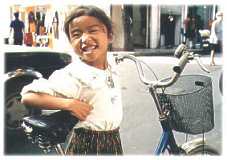 Wenzhou is the heart of Christianity in China today; many people kept
their faith through the Cultural Revolution, and in the 1980s the freed church
grew in leaps and bounds
Wenzhou is the heart of Christianity in China today; many people kept
their faith through the Cultural Revolution, and in the 1980s the freed church
grew in leaps and bounds
WENZHOU, China — The airliner’s approach route took us over the beautiful and seemingly endless patchwork quilt of rice paddies and fish pond farms on the Pacific coast of China.
When the pilot landed the plane on the runway, the first building you noticed after the airport building was a huge cathedral-like church. We had arrived in Wenzhou, called the Jerusalem of China because of its large number of Christians.
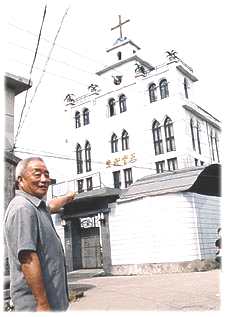 Wenzhou is an ancient city founded in
the fourth century AD. Unlike many other coastal cities of China, no foreign
settlements developed after its ports were forced open in 1877. Most of the few
foreigners who came here were tea traders and missionaries.
Wenzhou is an ancient city founded in
the fourth century AD. Unlike many other coastal cities of China, no foreign
settlements developed after its ports were forced open in 1877. Most of the few
foreigners who came here were tea traders and missionaries.
Today, thanks to China’s newly-won economic freedom, Wenzhou is a prosperous and fast-growing city of six million citizens. They are renowned throughout China for their diligence and hard work, for being keen businessmen, and for preserving their faith and identity.
They are also known for their love of the Word of God. It was brought to the city by Christian missionaries during the last century, and has been cherished ever since and defended even through times of appalling hardships. The faithful devotion to Christ found in Wenzhou congregations today would astound and overwhelm any visitor. (SR 20/3 - 3.99) [PHOTOS]
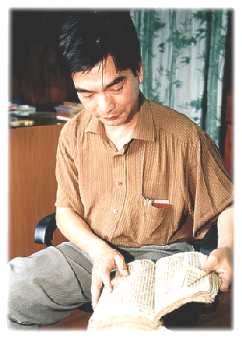 WENZHOU, China — Visiting the churches
in Wenzhou is a moving experience – an example of human endurance, faith and
optimism.
WENZHOU, China — Visiting the churches
in Wenzhou is a moving experience – an example of human endurance, faith and
optimism.
“The Cultural Revolution was more brutal here because of the strong Christian tradition in Wenzhou,” explains our tour guide, the Rev Yu Cheng Kun.
“Mao Zedong wanted China to be ‘liberated’ from all religious beliefs.” Nothing was sacred in those days: teachers, scientists, artists and religious groups of all kinds were persecuted, humiliated, sent to labour camps, or even killed by the Red Guards.
Red Guard
Mr Yu was one of those Red Guards. At the age of 15 he was a prominent youth Communist Party secretary and class president – a young man with a bright future.
“One day, in the streets of Wenzhou, something drew me into a church full of worshipping Christians,” he says. “The love I met changed my life. I was filled with the Holy Spirit and decided to put my life into the hands of God.”
He was then expelled from the Communist Party and thrown out of the senior high school. However, his faith grew in strength and he spent many nights hand-copying the Bible from Genesis to Revelation because it was impossible to buy Bibles, and the Red Guards destroyed every Bible they could find.
Eventually, the political climate changed and the enforcement of the ban on religious activities was relaxed. Yu Cheng Kun was now able to fulfil one of his dreams: to study theology. He went to Nanjing Theological Seminary after it had reopened in 1979, and was among the first batch of new graduates from the seminary.
Today Mr Yu is married and has two children –
twins! He is the ordained pastor of the Flower Garden Lane Church. He is also
the vice-chairman of Wenzhou China Christian Council. (SR 20/4 - 3.99)
[PHOTOS]
WENZHOU, China — One of the churches visited in Wenzhou was the Yong Guang (Eternal Light) Church – an old church which had been used during the revolution as an arts centre.
The church was built in 1942 at a time when the Christian church was growing fast. Then, in 1962, it was seized by the government and turned into an arts centre.
Scattered
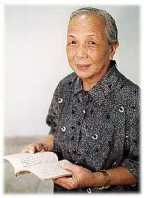 Church leader Mrs Guo Xiao Chen explained:
“Our flock had been scattered initially, but in 1968 Christians began to
reassemble in ‘house congregations’ which sprang up in the
vicinity.
Church leader Mrs Guo Xiao Chen explained:
“Our flock had been scattered initially, but in 1968 Christians began to
reassemble in ‘house congregations’ which sprang up in the
vicinity.
“We always kept alive the hope that one day, our own church would be returned to us. So, in the early 1990s, when other churches were being restored to their congregations, we made a formal request to the local government and asked them to return our church. Instead, they turned it into a dance hall, which was a terrible disappointment to all of us.
“Spontaneously 1,000 Christians went to the old church building and occupied it in a rare act of defiance. We ate here, we slept here in eight-hour shifts. We were very frightened because we knew how dangerous it was, but we trusted in God.
Restored
“Now and then we sent a representative to the local government to see what was going on and to say: ‘Please return our church to us!’ Finally, 807 days later, our beloved Eternal Light Church was restored to us,” said Mrs Guo.
The government then moved out, and they re-dedicated the church. But the congregation had soon outgrown the old building – clearly, they needed a bigger church.
By July 1997, the cornerstone of a new and much larger church had been laid. Each member of the congregation donated about US $600, some of them much more – the daily wage is about $3.60. Now a magnificent new church seating 1,000 with a further 2,000 possible in the basement, is almost finished.
Mrs Guo added: “The turn of events has proved
a special blessing to our congregation because it has gathered all Christians
into one flock. The result is that we are all extremely proud of our church and
take great care of it.” (SR 20/5 - 3.99) [PHOTOS]
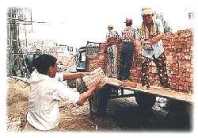 WENZHOU, China — When Au Jiang
Church, with room for 1,000 worshippers, became too small soon after its
opening, the new and larger Au Jiang II Church was built.
WENZHOU, China — When Au Jiang
Church, with room for 1,000 worshippers, became too small soon after its
opening, the new and larger Au Jiang II Church was built.
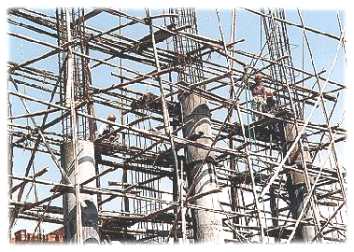
However, owing to the explosive growth of Christianity in the area, a third church was soon being planned. A piece of land was found, and for the next two years a group of Christians, mostly elderly women, met together every day to pray for God’s help in the fundraising effort.
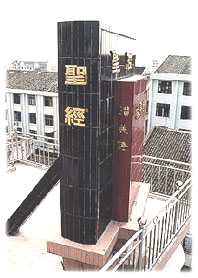
When 82-year-old Zhang Risheng donated a large sum of money, many others followed suit, and soon the land was bought and plans were made for a new church. The new church, now half-finished, will be seven storeys high and will seat 3,000. It will cost US $400,000 and will be financed solely by its own congregation.
Range of gifts
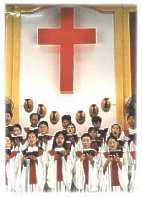 Some members have even borrowed money to donate and
used their own properties as collateral. Gifts range from large sums of money to
whatever a person can afford. Some have given a bag of cement, some have brought
wood or other kinds of building material, while others have ‘adopted’ a window,
an electric fan or the baptismal font.
Some members have even borrowed money to donate and
used their own properties as collateral. Gifts range from large sums of money to
whatever a person can afford. Some have given a bag of cement, some have brought
wood or other kinds of building material, while others have ‘adopted’ a window,
an electric fan or the baptismal font.
But the most amazing fact is that from roof to basement, the 150-foot-high church is being built by volunteers, and all the expertise has come from within the congregation. (SR 20/6 - 3.99) [PHOTOS]
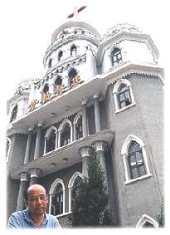 “The Cultural Revolution helped in the rebirth of our
church,” says You Qian Cheng, a volunteer in charge of Lofu Church, Yongjia
County.
“The Cultural Revolution helped in the rebirth of our
church,” says You Qian Cheng, a volunteer in charge of Lofu Church, Yongjia
County.
“Founded in 1877, it is comparatively old, but by 1958 only 11 families were still Christians here. In 1972, at the height of the Cultural Revolution, an incident happened that had a great impact on our community,” he said. “One day, during morning prayers, Shan Bao Ai’s family were trapped in their house in the middle of a fight between two rival groups of Red Guards. The house was riddled with bullets; hand grenades were thrown all around them.
“Inside, the terrified parents and their four children were sitting on a bed. Finally, the shooting stopped when the army moved in to take control. They found many dead Red Guards in and around the house, but none of the members of the Christian family was harmed. Afterwards they even found bullet holes in the woodwork of the bed they had been sitting on,” he says.
This miracle sparked off the unprecedented growth of Lofu Church. “The ever-rising number of Christians faced threats of imprisonment, hard labour, humiliation and even death, but we never stopped gathering for worship,” said You Qian Cheng. “First we met in the church and then, when that became impossible, in fields, then at night, and finally in the mountains. By the end of the Cultural Revolution, our congregation numbered more than 2,000 believers,” he recalled.
Today Lofu Church is bustling with activity.
“Forty-two churches send their young people here to learn hymns and read music,”
he said, “and we have daily Bible classes for every age. We value and emphasize
Bible study because the Bible is the basis of our faith. About 600 Bibles are
sold in our church every year.” (SR 20/7 - 3.99) [PHOTOS]
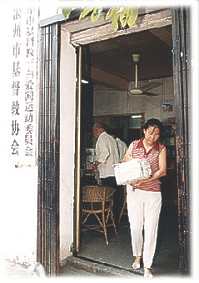 Wenzhou Bible Distribution Centre is
special because it is situated in a busy downtown street, next to Cheng Xi
Church, which also serves as the office of Wenzhou China Christian Council
(CCC).
Wenzhou Bible Distribution Centre is
special because it is situated in a busy downtown street, next to Cheng Xi
Church, which also serves as the office of Wenzhou China Christian Council
(CCC).
On the modest premises of the Bible Distribution Centre, business is brisk, people of all ages swarm in and out, browse and discuss new Bible editions, hymn books and commentaries.
An old worn abacus clicks; money changes hands, and Bibles are packed in boxes. Since the opening, 1.2 million Bibles have passed through this distribution centre.
An old man comes in, carrying a sum of money, which he has brought to buy Bibles on behalf of his congregation. Having paid and packed the Bibles in seven boxes, he flags down a ‘pedicab’ and gets ready for his three-hour trip home.
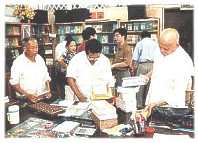
In 1987, in partnership
with Amity Foundation and the China Christian Council, the UBS set up the
Nanjing Bible printing press. Thanks to this foresight, Bibles are more easily
available across China today.
The Bible Societies around the world contribute to the production of these Bibles – the 20-millionth copy was printed in March. Thanks to this support, the cost of Bibles is low enough for most people to afford.
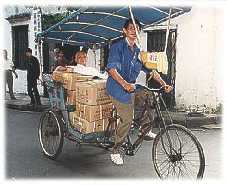 The Rev Yu Cheng Kun says:
“Christians in Wenzhou value the Bible highly. It is central in the lives of
Wenzhou, not only because it is the Holy Word of God, but also because we see it
as the foundation of our daily lives.
The Rev Yu Cheng Kun says:
“Christians in Wenzhou value the Bible highly. It is central in the lives of
Wenzhou, not only because it is the Holy Word of God, but also because we see it
as the foundation of our daily lives.
“Countless Christians in Wenzhou have learned to read better by studying their Bibles, and literate citizens often achieve more in their community.
“Christian communities here are wealthier, more disciplined and orderly, and they have lower crime rates,” he says. “The authorities have noticed this, and many churches have been honoured for their outstanding efforts on behalf of their community. In other words, Bible studies enrich our faith and makes us better citizens.”
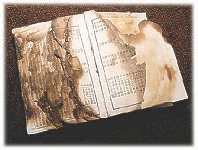 Mr Yu takes his visitors
upstairs to his CCC office and shows his exciting collection of Bibles from the
dark years of the Cultural Revolution – Bibles that have been hidden in a wall,
under a fireplace.
Mr Yu takes his visitors
upstairs to his CCC office and shows his exciting collection of Bibles from the
dark years of the Cultural Revolution – Bibles that have been hidden in a wall,
under a fireplace.
There is a hand-copied Bible camouflaged as Editorials from the People’s Red Flag Liberation Army Daily. There are partly burnt Bibles, stencilled Bibles, and Bibles which Mr Yu hand-copied himself.
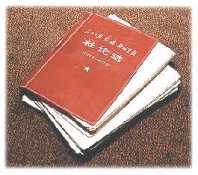
“It makes me realise the ease with which we
can obtain a Bible in the West, and how we often take the Word of God for
granted,” says Rune Hansen. “If we had suffered the same deprivation, I wonder
how much more we would treasure our Bibles. From now on I shall show more
respect for my own Bible.”
(SR 20/9 - 3.99) [PHOTOS]
Church in action – taking care of the elderly
The social structure in China is changing fast these years. The life-span of a Chinese citizen has increased as living standards have risen. This leaves a rapidly growing generation of elderly who need care, love and medical attention.
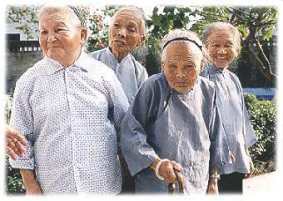 According to Chinese tradition, care of
the elderly is the family’s responsibility. Today, however, after many years of
the one-child-per-family policy, both the son and the daughter-in-law or the
daughter and the son-in-law are, in many cases, forced to work away from home,
and this leaves the elderly to look after themselves.
According to Chinese tradition, care of
the elderly is the family’s responsibility. Today, however, after many years of
the one-child-per-family policy, both the son and the daughter-in-law or the
daughter and the son-in-law are, in many cases, forced to work away from home,
and this leaves the elderly to look after themselves.
“We call it ‘Our Family’,” someone says when the visitors arrive at Wenzhou Christian Old People’s Home. Many elderly people come to line the entrance, waving and clapping their hands as the board and the local pastor welcome us warmly.
“Because of our love for Christ and for our fellow Christians,” says Mr Yang, chairman of the board, “we felt an urgent need to take over the responsibility of caring for the elderly. Since we could not expect any support from the government, all we could do was to pray and trust that God would help us to collect sufficient funding,” he continues.
Miracle
“By a miracle of God and thanks to support from fellow Christians living as far away as in Nanjing, ‘Our Family’ was established in 1992.”
Wenzhou Christian Old People’s Home is for Christians who are over 60 years old and preferably able to do their own housework. There is a clinic, a barbershop, and not far from the ‘Family Home’, is a high school. “Many students come over and help us, doing housework for the elderly people, washing their hair and cutting their nails,” says Mr Yang. “This is valuable to all because the young learn respect, and the old feel loved. It contributes to the feeling of belonging to a Christian family based on God’s love.”
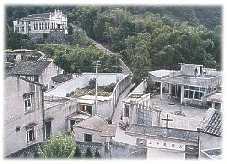 Bible study is central in the daily life
of the ‘Family’. “Every morning after breakfast we gather for prayer and Bible
lessons,” says Mr Yang. A question about the difficult times during the
revolution brought tears to the eyes of several of the old
people.
Bible study is central in the daily life
of the ‘Family’. “Every morning after breakfast we gather for prayer and Bible
lessons,” says Mr Yang. A question about the difficult times during the
revolution brought tears to the eyes of several of the old
people.
“It was a horrible time,” says one old lady,
“but we try to put it far behind us. Deep in our hearts we knew it would end, so
we never stopped gathering for prayer and worship. But we prefer not to talk
about it, because today we can read the Bible freely,” she adds with a smile.
(SR 20/10 - 3.99) [PHOTOS]
With 1,180 registered churches and only 31 ordained pastors and 132 non-ordained pastors, Wenzhou churches rely heavily on the ‘Marthas’ of the congregations – the volunteers who have always been ready to step in and offer help.
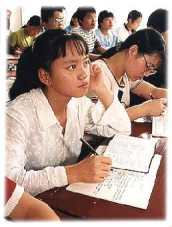 This help is often an expression of their
faith and gratitude to God. There are also more lay church workers today, and
most of these have received formal training. But many churches have no proper
lay workers and have to rely on volunteers, whose educational standards
vary.
This help is often an expression of their
faith and gratitude to God. There are also more lay church workers today, and
most of these have received formal training. But many churches have no proper
lay workers and have to rely on volunteers, whose educational standards
vary.
There are more than 3,000 church volunteers in this region, and the current challenge is to provide them with some form of training.
Rebuilding
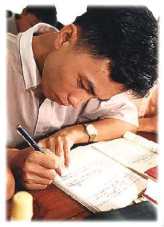 Immediately after the Cultural Revolution,
in the early 1980s, the Christians in Wenzhou concentrated on rebuilding the
physical framework of the church life. Now is the time to improve the human part
– the educational and social aspect of church life. Church volunteers can attend
the Wenzhou Lay Training Centre.
Immediately after the Cultural Revolution,
in the early 1980s, the Christians in Wenzhou concentrated on rebuilding the
physical framework of the church life. Now is the time to improve the human part
– the educational and social aspect of church life. Church volunteers can attend
the Wenzhou Lay Training Centre.
Centre Visit
Morning Bible lessons at the Centre were well under way when the visitors arrived at 8 a.m. The students had been up since 5:30 a.m. and after morning prayer and breakfast, classes in Bible Study begin.
Preaching
 There is instruction in preaching, hymn
and music studies, congregation management, and laws on religious policies –
that is the morning’s schedule. Because most of the volunteers in Wenzhou have
other jobs, a correspondence course is also popular.
There is instruction in preaching, hymn
and music studies, congregation management, and laws on religious policies –
that is the morning’s schedule. Because most of the volunteers in Wenzhou have
other jobs, a correspondence course is also popular.
Dedication
One could not help being impressed by the dedication and concentration of the students. While the visitors attended a Bible class, none of the students seemed to be distracted by the photographer moving around firing off 56 photographs.
Learning about the church and the Bible was
obviously far more important and time was too precious to waste. (SR 20/11 -
3.99) [PHOTOS]